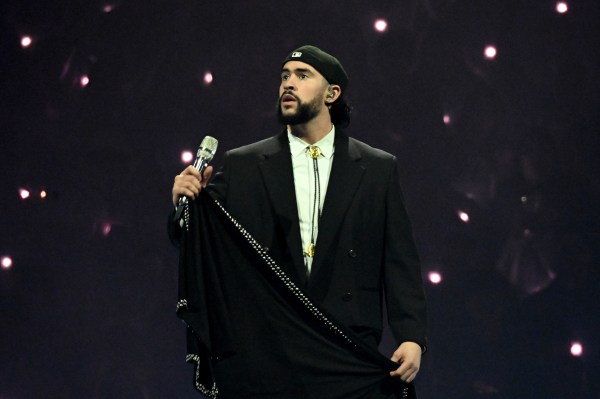Hi,
So on Saturday I gave a talk at an off-the-record event. I can’t tell you who introduced me, but you’ve heard of him. He’s a close friend. He’s 12 feet tall with a bright red unibrow that makes his prosthetic glass cat-eyes seem all the more fearsome.
Okay, that last sentence is not true. But who’s to say I don’t remember it that way?
I bring this up for a few reasons. First, because the friend and colleague who introduced me had gone through some old G-Files and declared that I had gotten worrisomely serious of late. When he made this charge, I stormed the stage and smacked him on the back of the head with a half-frozen halibut, sending his cat-eyes flying across the room where they bounced off Yuval Levin’s forehead—which took Yuval by surprise because he’d been trying to inconspicuously peruse Canadian porn on his iPhone.
Okay, again, that sentence is an embellishment. Which brings me to my next reason for bringing this up. While I didn’t actually smack my friend with a halibut, it did bother me that he thought I’d gotten too serious. So I’m going to keep this “news”letter like a Japanese game show—weirder than it needs to be, but weird enough to make the otherwise conventional proceedings interesting.
I had Paul Bloom, one of the world’s most renowned psychologists, on The Remnant this week, and he argued that memory is much, much more unreliable than we all like to think. He said that pretty much every time someone tells him an elaborate story about something that happened to them a long time ago, he assumes it’s going to be largely untrue.
Apparently, the academic literature is very clear on this point. Our memories lie—or we lie to ourselves about our memories. It’s like we have a little Bill Clinton homunculus inside our heads. Much like the real Bill Clinton, it doesn’t always completely fabricate events—though it sometimes does—but it almost always embellishes stories and fills in blanks in unreliable ways. Sure, remembering stuff like where you were on 9/11 or the first time you killed a man using only your thumb—or someone else’s thumb!—is pretty reliable. But even so, a lot of the details will be wrong.
One fascinating detail is that it’s not that the memories aren’t in there. In Bloom’s wonderful book, Psych: The Story of the Human Mind, he notes that our long-term memory has “virtually unlimited storage.” He writes, “Every word you know is in long-term memory, every face you recognize, every story, every joke, every victory, and every humiliation—they are all in long-term memory.” One respectable estimate is that our cranial hard drives hold “2.5 petabytes, about a million gigabytes” of storage capacity. “If you had a computer with that much memory, you could hold three million hours of video.”
That’s about 342 years.
So the problem isn’t that the stuff isn’t in there. The problem is that—for most of us—our factory-installed software has trouble accessing it reliably. Some of it can’t be accessed at all—again, save by some mutants with near-perfect recall. Not to be too gross, but think of all the times you’ve gone to the bathroom. How many can you remember with any specificity? It’s probably like .0001 percent. Sure, that time you passed that Rolex watch you swallowed on a dare sticks out. But the more common an experience, the less your brain thinks it’s necessary for you to access the memory.
Imagine your brain is a hoarder or an obsessive packrat. You know somewhere in the piles is your nine-year-old receipt from Chipotle, but there’s no need to fish it out from wherever it is.
But even significant events are hard to recall verbatim, so your brain reconstructs the missing bits. And because we tend to like to tell stories—to ourselves and to others—the missing bits either make us, or the story, better over time. Such is our power of self-deception. It’s not altogether impossible that if I were to tell the story of my 7-foot friend with the Ronald McDonald-fro unibrow often enough, I would start to believe it myself.
Non-memory lanes.
Now, Bloom—who is a mensch—is much more forgiving of people who tell totally unbelievable stories than I am. For instance, he gives Hillary Clinton a pass for her story about landing in Bosnia under sniper fire. I don’t. She started telling the story when it was still pretty recent. If the story had been true, it wouldn’t have stayed an anecdote to entertain donors with. From the Washington Post’s fact-check in 2016:
Had Hillary Clinton’s plane come “under sniper fire” in March 1996, we would certainly have heard about it long before now. Numerous reporters, including The Washington Post’s John Pomfret, covered her trip. A review of nearly 100 news accounts of her visit shows that not a single newspaper or television station reported any security threat to the first lady. “As a former AP wire service hack, I can safely say that it would have been in my lead had anything like that happened,” said Pomfret.
I’m willing to credit that Clinton had told the story so many times that she came to believe it—like Brian Williams and his stories about surviving Stalingrad or whatever it was he used to say, I can’t remember. But peddling a false—and easily checkable—memory isn’t something we should cavalierly dismiss in politicians.
Which brings me to Joe Biden. While I think Donald Trump consciously lies more than any public figure in my lifetime, I think Biden unconsciously lies more than any public figure I’ve ever seen. Some are just old man stories, like his claim that in the second congressional baseball game he showed major league promise when he hit a 368 foot single.
But other stories are weirder and more significant. He’s claimed, many times, that he was arrested in South Africa along with Andrew Young and Nelson Mandela. It never happened. As Young told the New York Times, “I was never arrested and I don't think [Biden] was, either.”
More than once, he’s insisted that he was arrested marching with civil rights protesters in the 1960s. Last year he told an audience in Atlanta, “I did not walk in the shoes of generations of students who walked these grounds. But I walked other grounds. Because I’m so damn old, I was there as well. You think I’m kidding, man. It seems like yesterday the first time I got arrested.”
Nope.
He frequently claims he went to a black church during the civil rights era and organized marches. Almost surely, nah-ah. He’s said he did legal work for the Black Panthers and fought to desegregate movie theaters. Not true.
He says his Uncle Frank fought in the Battle of the Bulge, earning a Purple Heart but never receiving it. But, the story goes, as vice president, he successfully fought to rectify this at the behest of his father. The only problem? Both his dad and his uncle died long before he became vice president. No wait, that’s not the only problem. Frank was never awarded the Purple Heart. It’s unclear whether he even fought in the Battle of the Bulge.
And just this week, he was interviewed by Kal Penn for The Daily Show. Asked about his “evolution” on marriage equality for gays, he said, “I can remember exactly where my epiphany was.” He was a senior in high school and his dad was dropping him off at school, “and I remember I am about to get out of the car and looked to my right and two well-dressed men in suits kissed each other.”
“And I’ll never forget it; I turned and looked at my dad. And he said: ‘Joey, it’s simple; they love each other.’”
“It’s just that simple.”
Now, the issue may be “just that simple.” But the facts aren’t.
I don’t believe he saw this. I don’t believe his dad said anything of the sort. I don’t believe his working-class father would have said anything like this.
But we have four options here.
Option 1: We can believe he’s telling the truth.
Option 2: We can believe he’s lying.
Option 3: He’s telling the truth in that he believes his own false and manufactured memories.
Option 4: All of the above. Some of it might be true—or true-ish (funny, it doesn’t look true-ish)—and he largely believes his own heroic tales. Or maybe not. The crux of Option 4 is that we just shouldn’t care.
The remarkable thing is that Option 1 is the most damning. If he’s telling the truth about the “epiphany” he had about gay marriage when he was dropped off at his Catholic private school—at a time when nobody was talking about gay marriage—that means he went more than a half-century refusing to say or do anything about it. He supported the Defense of Marriage Act in 1996. And in 1994 he voted for a law blocking funds for schools that “normalize” homosexuality. He campaigned for senator—roughly 700 times—and for president and vice president a few times opposing gay marriage.
On his own terms, this is not at all dissimilar to believing in equal rights for blacks but spending a half-century in public life defending segregation (another issue where his record is more complex than his tall tales would suggest).
Option 2 is pretty damning also. It means he’s just a hackish politician who makes up wildly implausible and self-serving stuff, retroactively claiming moral and political courage when convenient.
Option 3 is the tough one. Personally, I find the possibility that he’s literally delusional about his own life pretty disturbing. It may be naïve to want politicians to tell the truth, but I don’t think it’s naïve to want politicians to know what the truth is—especially about themselves. If he thinks his life is an uninterrupted story of heroically standing athwart the political demands of the time—and let me be clear that this is only slightly more delusional than believing he’s a sentient bag of tennis balls wrapped in a human meat suit—how will he respond to new challenges?
And then there’s Option 4. This is almost surely where Kal Penn lands. I don’t think Penn is nearly as brilliant as his fans do, but I don’t think he’s an idiot either. But Penn was perfectly happy to let this fairy tale sail by uncontested, and he’s hardly alone.
I understand why so many Biden fans and allies simply choose to shrug. After all, even if Biden is worse than Trump about sincerely believing falsehoods, we’ve seen much the same response to Trump’s fabrications from his fans. And while I think my record of opposing all that enabling is pretty clear, I will confess that I cut Ronald Reagan slack for some of his tall tales (and still do because I don’t think they were nearly as worrisome or egregious). What’s remarkable is how Biden’s fans can be horrified and enraged by Trump’s BS and vice versa.
I should also note that the issue of “worse” is a distraction. I’m totally open to the argument that I’ve scored this wrong. Let’s say Trump was worse than Biden—who cares? The point is that both get a failing grade.
I think the simplest answer is it’s just too damn hard to take this stuff seriously when the offender is on your side.
So, barring some unforeseen event, the Democrats will renominate someone who is either a profound and compulsive liar or a fantasist. And there’s a non-trivial chance that candidate will run against Donald Trump, his closest competitor in this regard.
It all reminds me of that time I was told I had no choice but to fight a rabid bear or an angry killer robot if I wanted to receive my award for America’s most handsome pundit.







Please note that we at The Dispatch hold ourselves, our work, and our commenters to a higher standard than other places on the internet. We welcome comments that foster genuine debate or discussion—including comments critical of us or our work—but responses that include ad hominem attacks on fellow Dispatch members or are intended to stoke fear and anger may be moderated.
With your membership, you only have the ability to comment on The Morning Dispatch articles. Consider upgrading to join the conversation everywhere.